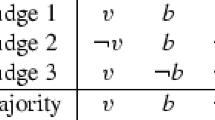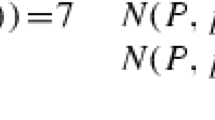Abstract
This paper provides an introductory review of the theory of judgment aggregation. It introduces the paradoxes of majority voting that originally motivated the field, explains several key results on the impossibility of propositionwise judgment aggregation, presents a pedagogical proof of one of those results, discusses escape routes from the impossibility and relates judgment aggregation to some other salient aggregation problems, such as preference aggregation, abstract aggregation and probability aggregation. The present illustrative rather than exhaustive review is intended to give readers who are new to the field of judgment aggregation a sense of this rapidly growing research area.
Similar content being viewed by others
References
Arrow K. (1951) Social choice and individual values. Wiley, New York, NY
Black D. (1948) On the rationale of group decision-making. Journal of Political Economy 56(1): 23–34
Bovens L., Rabinowicz W. (2006) Democratic answers to complex questions—an epistemic perspective. Synthese 150(1): 131–153
Brennan G. (2001) Collective coherence?. International Review of Law and Economics 21(2): 197–211
Chapman B. (2002) Rational aggregation. Politics, Philosophy and Economics 1(3): 337–354
Dietrich F. (2006) Judgment aggregation: (Im)possibility theorems. Journal of Economic Theory 126(1): 286–298
Dietrich F. (2007a) A generalised model of judgment aggregation. Social Choice and Welfare 28(4): 529–565
Dietrich, F. (2007b). Aggregation theory and the relevance of some issues to others. Working Paper, University of Maastricht.
Dietrich F. (2010) Bayesian group belief. Social Choice and Welfare 35(4): 595–626
Dietrich F., List C. (2007a) Arrow’s theorem in judgment aggregation. Social Choice and Welfare 29(1): 19–33
Dietrich F., List C. (2007b) Judgment aggregation by quota rules: Majority voting generalized. Journal of Theoretical Politics 19(4): 391–424
Dietrich F., List C. (2007c) Strategy-proof judgment aggregation. Economics and Philosophy 23: 269–300
Dietrich, F., & List, C. (2007d). Judgment aggregation with consistency alone. Working Paper, London School of Economics.
Dietrich F., List C. (2008a) Judgment aggregation without full rationality. Social Choice and Welfare 31: 15–39
Dietrich, F., & List, C. (2008b). Opinion pooling on general agendas. Working Paper, London School of Economics.
Dietrich F., List C. (2008c) A liberal paradox for judgment aggregation. Social Choice and Welfare 31: 59–78
Dietrich F., List C. (2008d) Judgment aggregation under constraints. In: Boylan T., Gekker R. (eds) Economics, rational choice and normative philosophy. Routledge, London
Dietrich F., List C. (2010a) Majority voting on restricted domains. Journal of Economic Theory 145(2): 512–543
Dietrich F., List C. (2010b) The aggregation of propositional attitudes: Towards a general theory. Oxford Studies in Epistemology 3: 215–234
Dietrich F., Mongin P. (2010) The premise-based approach to judgment aggregation. Journal of Economic Theory 145(2): 562–582
Dokow E., Holzman R. (2010a) Aggregation of binary evaluations. Journal of Economic Theory 145(2): 495–511
Dokow E., Holzman R. (2010b) Aggregation of binary evaluations with abstentions. Journal of Economic Theory 145(2): 544–561
Dryzek J., List C. (2003) Social choice theory and deliberative democracy: A reconciliation. British Journal of Political Science 33(1): 1–28
Gärdenfors P. (2006) An Arrow-like theorem for voting with logical consequences. Economics and Philosophy 22(2): 181–190
Genest C., Zidek J. V. (1986) Combining probability distributions: A critique and annotated bibliography. Statistical Science 1(1): 113–135
Guilbaud G. Th. (1966) Theories of the general interest, and the logical problem of aggregation. In: Lazarsfeld P.F., Henry N.W. (eds) Readings in mathematical social science. MIT Press, Cambridge, MA, pp 262–307
Knight J., Johnson J. (1994) Aggregation and deliberation: On the possibility of democratic legitimacy. Political Theory 22(2): 277–296
Konieczny S., Pino Pérez R. (2002) Merging information under constraints: A logical framework. Journal of Logic and Computation 12(5): 773–808
Kornhauser L. A. (1992) Modeling collegial courts. II. Legal doctrine. Journal of Law, Economics and Organization 8: 441–470
Kornhauser L. A., Sager L. G. (1986) Unpacking the court. Yale Law Journal 96(1): 82–117
Kornhauser L. A., Sager L. G. (1993) The one and the many: Adjudication in collegial courts. California Law Review 81: 1–59
Kornhauser L. A., Sager L. G. (2004) The many as one: Integrity and group choice in paradoxical cases. Philosophy and Public Affairs 32: 249–276
List, C. (2003). A possibility theorem on aggregation over multiple interconnected propositions. Mathematical Social Sciences, 45(1), 1–13 (with Corrigendum in Mathematical Social Sciences, 52, 109–110).
List C. (2004) A model of path-dependence in decisions over multiple propositions. American Political Science Review 98(3): 495–513
List C. (2006) The discursive dilemma and public reason. Ethics 116(2): 362–402
List C. (2011) Group deliberation and the revision of judgments: An impossibility result. Journal of Political Philosophy 19(1): 1–27
List C., Pettit P. (2002) Aggregating sets of judgments: An impossibility result. Economics and Philosophy 18(1): 89–110
List C., Pettit P. (2004) Aggregating sets of judgments: Two impossibility results compared. Synthese 140(1–2): 207–235
List C., Pettit P. (2005) On the many as one. Philosophy and Public Affairs 33(4): 377–390
List C., Puppe C. (2009) Judgment aggregation: A survey. In: Anand P., Puppe C., Pattanaik P. (eds) Oxford handbook of rational and social choice. Oxford University Press, Oxford
McConway K. (1981) Marginalization and linear opinion pools. Journal of the American Statistical Association 76: 410–414
Miller D. (1992) Deliberative democracy and social choice. Political Studies 40(Special Issue): 54–67
Mongin P. (1995) Consistent Bayesian aggregation. Journal of Economic Theory 66: 313–351
Mongin P. (2008) Factoring out the impossibility of logical aggregation. Journal of Economic Theory 141(1): 100–113
Nehring K. (2003) Arrow’s theorem as a corollary. Economics Letters 80(3): 379–382
Nehring, K., & Puppe, C. (2002). Strategyproof social choice on single-peaked domains: Possibility, impossibility and the space between. Working Paper, University of California at Davis.
Nehring K., Puppe C. (2007) The structure of strategy-proof social choice—Part I: General characterization and possibility results on median spaces. Journal of Economic Theory 135(1): 269–305
Nehring K., Puppe C. (2010) Abstract Arrovian aggregation. Journal of Economic Theory 145(2): 467–494
Pauly M., van Hees M. (2006) Logical constraints on judgment aggregation. Journal of Philosophical Logic 35(6): 569–585
Pettit P. (2001) Deliberative democracy and the discursive dilemma. Philosophical Issues 11: 268–299
Pettit P. (2006) When to defer to majority testimony—and when not. Analysis 66: 179–187
Pigozzi G. (2006) Belief merging and the discursive dilemma: An argument-based account to paradoxes of judgment aggregation. Synthese 152(2): 285–298
Pivato, M. (2008). The discursive dilemma and probabilistic judgement aggregation. Munich Personal RePEc Archive.
Riker W. (1982) Liberalism against populism. W. H. Freeman, San Franscisco, CA
Rubinstein A., Fishburn P. C. (1986) Algebraic aggregation theory. Journal of Economic Theory 38(1): 63–77
Sen A. K. (1966) A possibility theorem on majority decisions. Econometrica 34(2): 491–499
Sen A. K. (1970) The impossibility of a Paretian liberal. Journal of Political Economy 78: 152–157
Spector H. (2009) The right to a constitutional jury. Legisprudence 3(1): 111–123
Vacca, R. (1921). Opinioni Individuali e Deliberazioni Collettive. Rivista Internazionale di Filosofia del Diritto 52–59.
Wilson R. (1975) On the theory of aggregation. Journal of Economic Theory 10(1): 89–99
Author information
Authors and Affiliations
Corresponding author
Rights and permissions
About this article
Cite this article
List, C. The theory of judgment aggregation: an introductory review. Synthese 187, 179–207 (2012). https://doi.org/10.1007/s11229-011-0025-3
Received:
Accepted:
Published:
Issue Date:
DOI: https://doi.org/10.1007/s11229-011-0025-3




